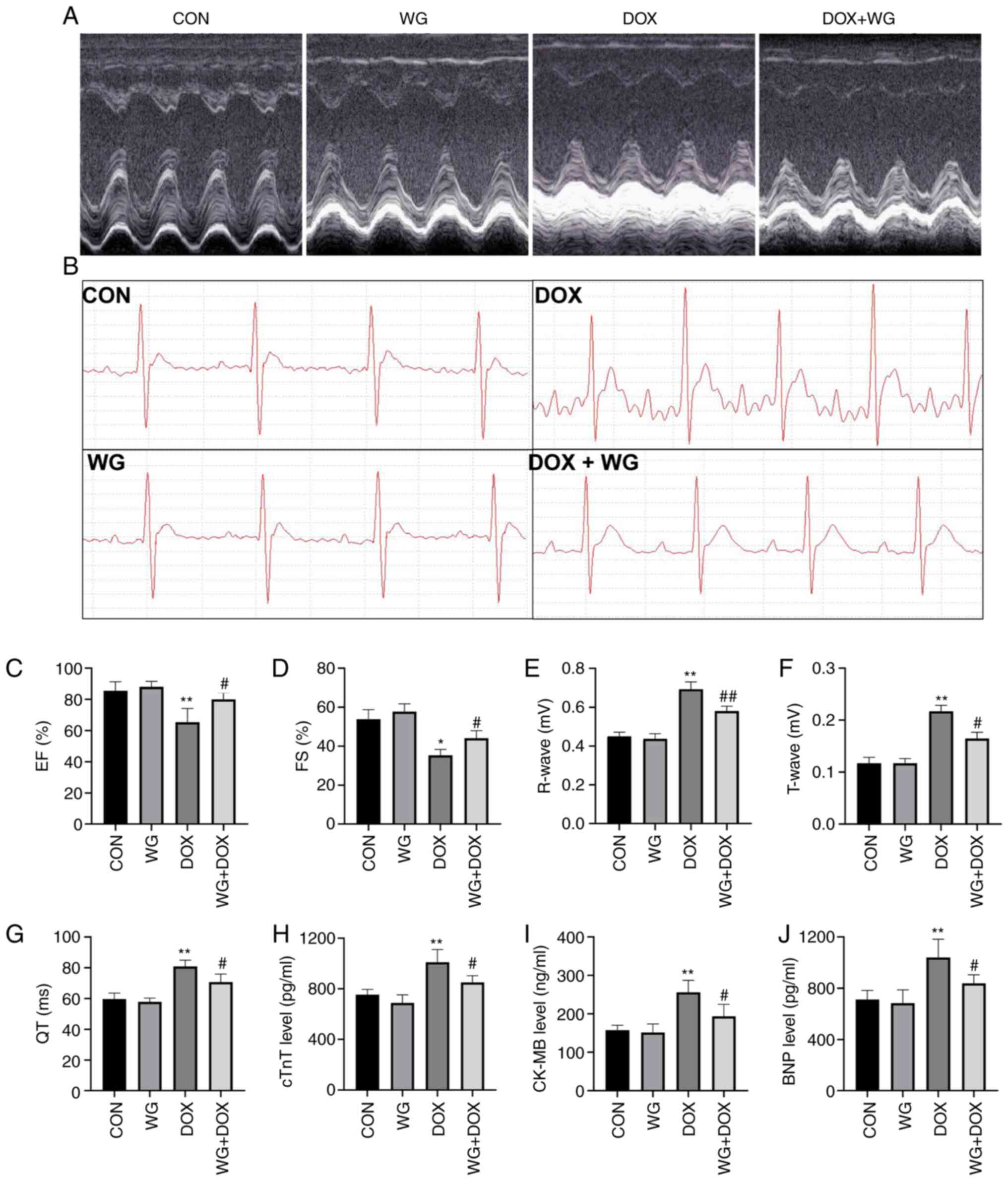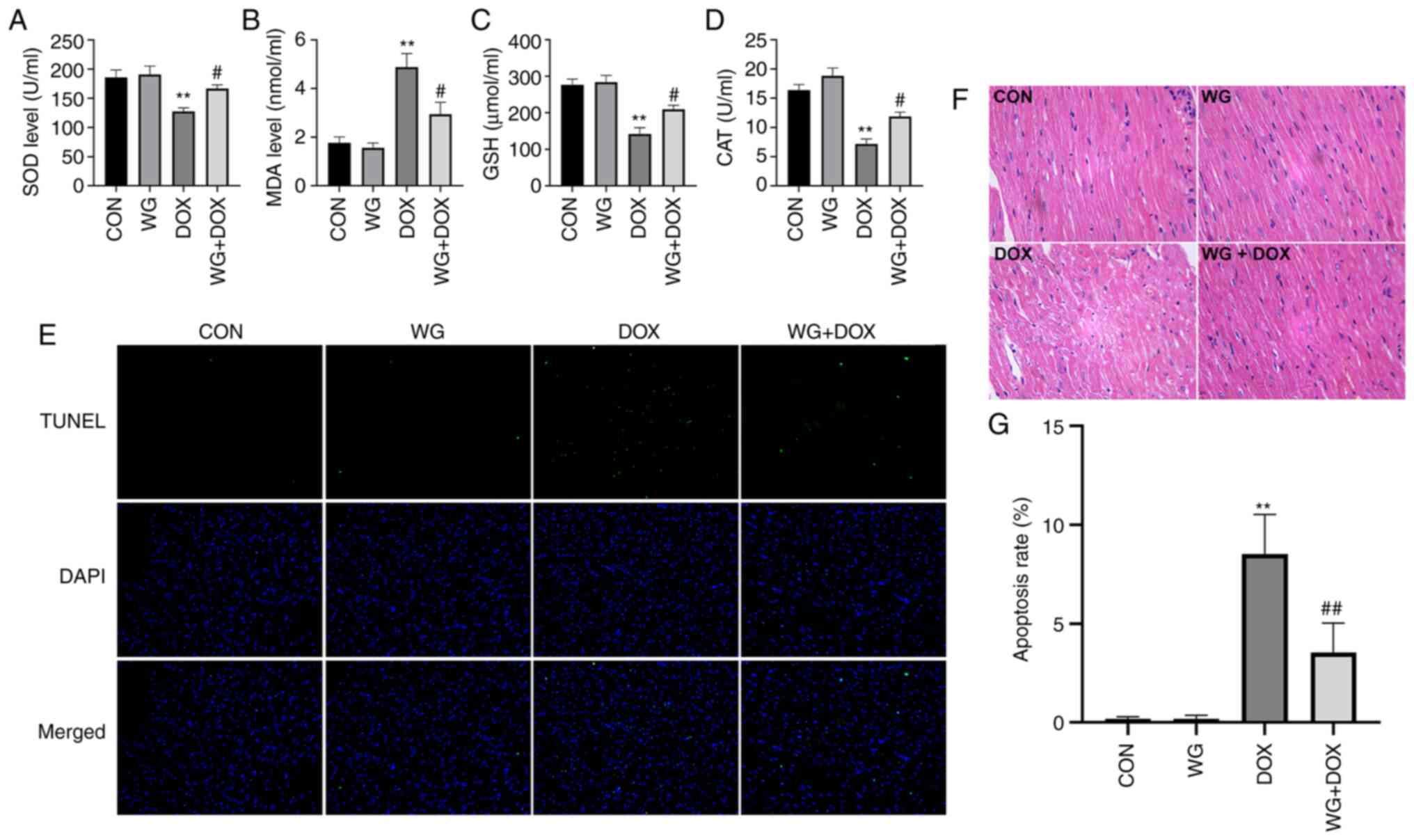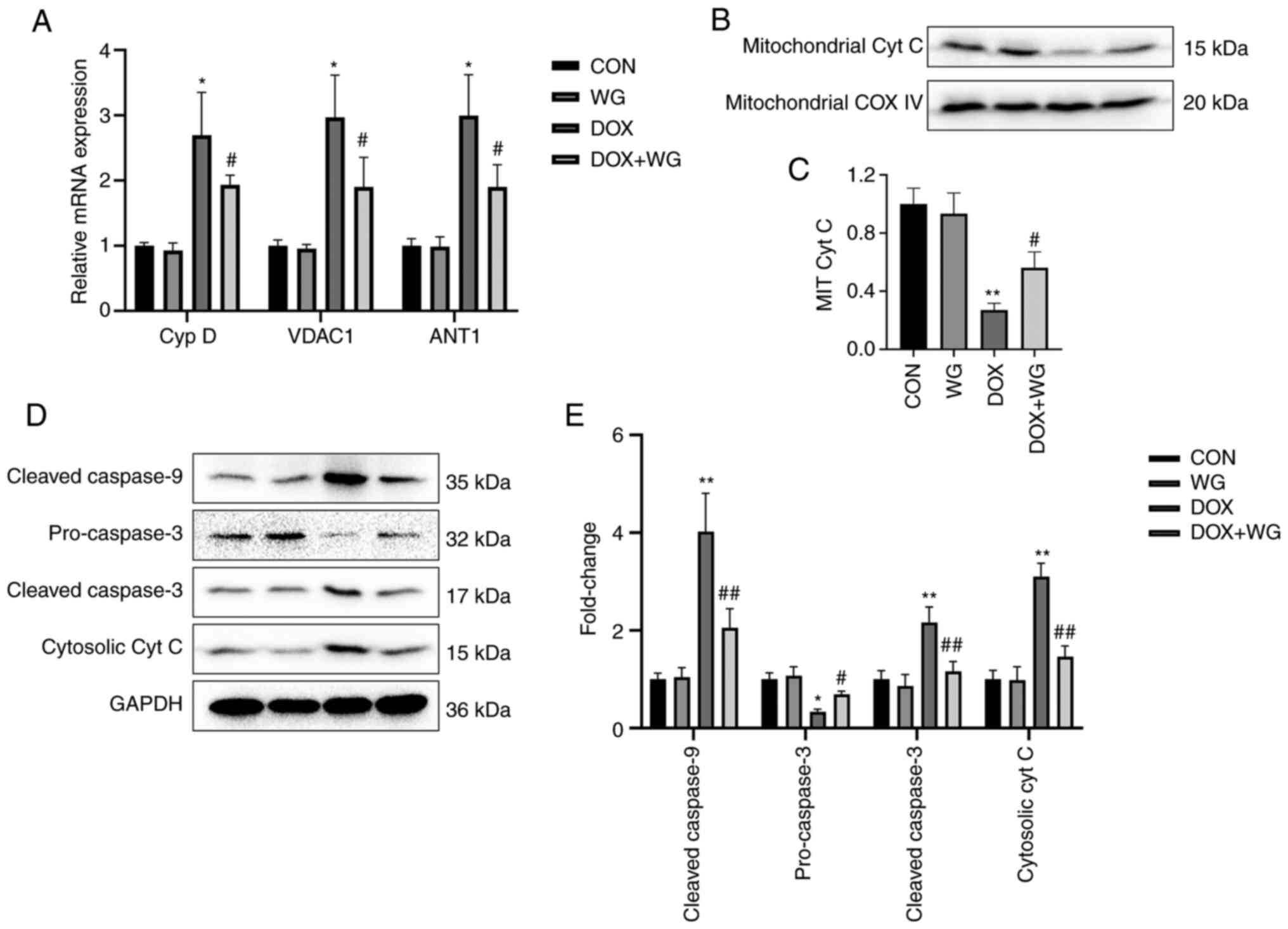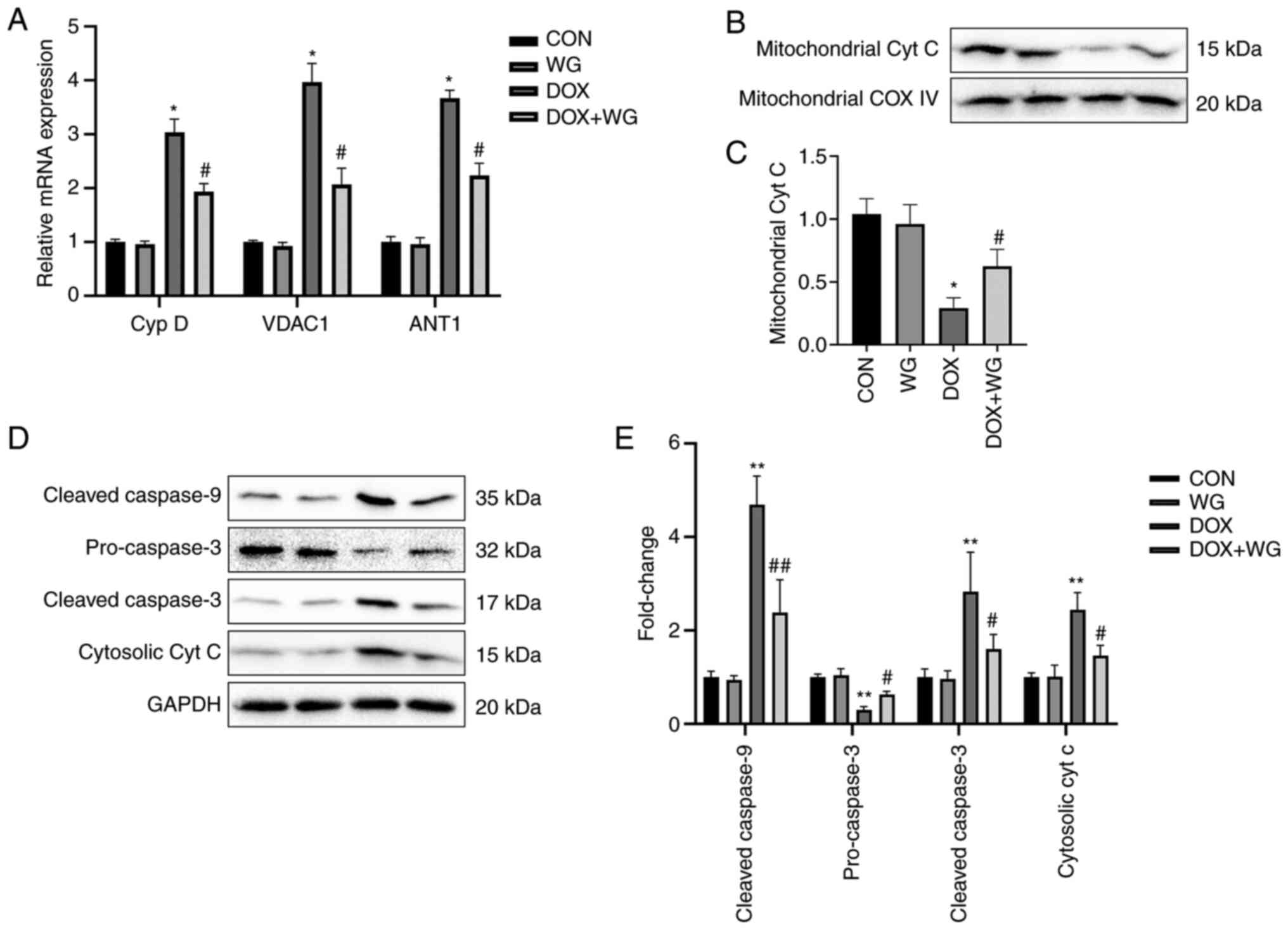|
1
|
Speth PA, van Hoesel QG and Haanen C:
Clinical pharmacokinetics of doxorubicin. Clin Pharmacokinet.
15:15–31. 1988.PubMed/NCBI View Article : Google Scholar
|
|
2
|
Nam J, Son S, Ochyl LJ, Kuai R,
Schwendeman A and Moon JJ: Chemo-photothermal therapy combination
elicits anti-tumor immunity against advanced metastatic cancer. Nat
Commun. 9(1074)2018.PubMed/NCBI View Article : Google Scholar
|
|
3
|
Koleini N and Kardami E: Autophagy and
mitophagy in the context of doxorubicin-induced cardiotoxicity.
Oncotarget. 8:46663–46680. 2017.PubMed/NCBI View Article : Google Scholar
|
|
4
|
Tadokoro T, Ikeda M, Ide T, Deguchi H,
Ikeda S, Okabe K, Ishikita A, Matsushima S, Koumura T, Yamada KI,
et al: Mitochondria-dependent ferroptosis plays a pivotal role in
doxorubicin cardiotoxicity. JCI Insight. 5(e132747)2020.PubMed/NCBI View Article : Google Scholar
|
|
5
|
Shi H, Tang H, Ai W, Zeng Q, Yang H, Zhu
F, Wei Y, Feng R, Wen L, Pu P and He Q: Schisandrin B antagonizes
cardiotoxicity induced by pirarubicin by inhibiting mitochondrial
permeability transition pore (mPTP) opening and decreasing
cardiomyocyte apoptosis. Front Pharmacol. 12(733805)2021.PubMed/NCBI View Article : Google Scholar
|
|
6
|
Han Y, Cai Y, Lai X, Wang Z, Wei S, Tan K,
Xu M and Xie H: lncRNA RMRP prevents mitochondrial dysfunction and
cardiomyocyte apoptosis via the miR-1-5p/hsp70 axis in LPS-induced
sepsis mice. Inflammation. 43:605–618. 2020.PubMed/NCBI View Article : Google Scholar
|
|
7
|
Songbo M, Lang H, Xinyong C, Bin X, Ping Z
and Liang S: Oxidative stress injury in doxorubicin-induced
cardiotoxicity. Toxicol Lett. 307:41–48. 2019.PubMed/NCBI View Article : Google Scholar
|
|
8
|
Wenningmann N, Knapp M, Ande A, Vaidya TR
and Ait-Oudhia S: Insights into doxorubicin-induced cardiotoxicity:
Molecular mechanisms, preventive strategies, and early monitoring.
Mol Pharmacol. 96:219–232. 2019.PubMed/NCBI View Article : Google Scholar
|
|
9
|
Fang X, Wang H, Han D, Xie E, Yang X, Wei
J, Gu S, Gao F, Zhu N, Yin X, et al: Ferroptosis as a target for
protection against cardiomyopathy. Proc Natl Acad Sci USA.
116:2672–2680. 2019.PubMed/NCBI View Article : Google Scholar
|
|
10
|
Sangweni NF, Moremane M, Riedel S, van
Vuuren D, Huisamen B, Mabasa L, Barry R and Johnson R: The
prophylactic effect of pinocembrin against doxorubicin-induced
cardiotoxicity in an in vitro H9c2 cell model. Front Pharmacol.
11(1172)2020.PubMed/NCBI View Article : Google Scholar
|
|
11
|
Khan NM, Haseeb A, Ansari MY, Devarapalli
P, Haynie S and Haqqi TM: Wogonin, a plant derived small molecule,
exerts potent anti-inflammatory and chondroprotective effects
through the activation of ROS/ERK/Nrf2 signaling pathways in human
osteoarthritis chondrocytes. Free Radic Biol Med. 106:288–301.
2017.PubMed/NCBI View Article : Google Scholar
|
|
12
|
Lucas CD, Dorward DA, Sharma S, Rennie J,
Felton JM, Alessandri AL, Duffin R, Schwarze J, Haslett C and Rossi
AG: Wogonin induces eosinophil apoptosis and attenuates allergic
airway inflammation. Am J Respir Crit Care Med. 191:626–636.
2015.PubMed/NCBI View Article : Google Scholar
|
|
13
|
Shi X, Zhang B, Chu Z, Han B, Zhang X,
Huang P and Han J: Wogonin inhibits cardiac hypertrophy by
activating Nrf-2-mediated antioxidant responses. Cardiovasc Ther.
2021(9995342)2021.PubMed/NCBI View Article : Google Scholar
|
|
14
|
Chang WT, Shao ZH, Vanden Hoek TL, McEntee
E, Mehendale SR, Li J, Becker LB and Yuan CS: Cardioprotective
effects of grape seed proanthocyanidins, baicalin and wogonin:
Comparison between acute and chronic treatments. Am J Chin Med.
34:363–365. 2006.PubMed/NCBI View Article : Google Scholar
|
|
15
|
Bei W, Jing L and Chen N: Cardio
protective role of wogonin loaded nanoparticle against
isoproterenol induced myocardial infarction by moderating oxidative
stress and inflammation. Colloids Surf B Biointerfaces.
185(110635)2020.PubMed/NCBI View Article : Google Scholar
|
|
16
|
Hydock DS, Lien CY, Jensen BT, Parry TL,
Schneider CM and Hayward R: Rehabilitative exercise in a rat model
of doxorubicin cardiotoxicity. Exp Biol Med (Maywood).
237:1483–1492. 2012.PubMed/NCBI View Article : Google Scholar
|
|
17
|
Hiensch AE, Bolam KA, Mijwel S, Jeneson
JAL, Huitema ADR, Kranenburg O, van der Wall E, Rundqvist H,
Wengstrom Y and May AM: Doxorubicin-induced skeletal muscle
atrophy: Elucidating the underlying molecular pathways. Acta
Physiol (Oxf). 229(e13400)2020.PubMed/NCBI View Article : Google Scholar
|
|
18
|
Badawy AM, El-Naga RN, Gad AM, Tadros MG
and Fawzy HM: Wogonin pre-treatment attenuates cisplatin-induced
nephrotoxicity in rats: Impact on PPAR-γ, inflammation, apoptosis
and Wnt/β-catenin pathway. Chem Biol Interact. 308:137–146.
2019.PubMed/NCBI View Article : Google Scholar
|
|
19
|
Luo S, Wang T, Qin H, Lei H and Xia Y:
Obligatory role of heat shock protein 90 in iNOS induction. Am J
Physiol Cell Physiol. 301:C227–C233. 2011.PubMed/NCBI View Article : Google Scholar
|
|
20
|
Livak KJ and Schmittgen TD: Analysis of
relative gene expression data using real-time quantitative PCR and
the 2(-Delta Delta C(T)) method. Methods. 25:402–408.
2001.PubMed/NCBI View Article : Google Scholar
|
|
21
|
Shi H, Zeng Q, Wei Y, Yang H, Tang H, Wang
D, Pu P and Feng R: Canagliflozin is a potential cardioprotective
drug but exerts no significant effects on pirarubicin-induced
cardiotoxicity in rats. Mol Med Rep. 24(703)2021.PubMed/NCBI View Article : Google Scholar
|
|
22
|
Zhang K, Guo QL, You QD, Yang Y, Zhang HW,
Yang L, Gu HY, Qi Q, Tan Z and Wang X: Wogonin induces the
granulocytic differentiation of human NB4 promyelocytic leukemia
cells and up-regulates phospholipid scramblase 1 gene expression.
Cancer Sci. 99:689–695. 2008.PubMed/NCBI View Article : Google Scholar
|
|
23
|
Yang D, Guo Q, Liang Y, Zhao Y, Tian X, Ye
Y, Tian J, Wu T and Lu N: Wogonin induces cellular senescence in
breast cancer via suppressing TXNRD2 expression. Arch Toxicol.
94:3433–3447. 2020.PubMed/NCBI View Article : Google Scholar
|
|
24
|
Wang C and Cui C: Inhibition of lung
cancer proliferation by wogonin is associated with activation of
apoptosis and generation of reactive oxygen species. Balkan Med J.
37:29–33. 2019.PubMed/NCBI View Article : Google Scholar
|
|
25
|
Kalyanaraman B: Teaching the basics of the
mechanism of doxorubicin-induced cardiotoxicity: Have we been
barking up the wrong tree? Redox Biol. 29(101394)2020.PubMed/NCBI View Article : Google Scholar
|
|
26
|
Ruggeri C, Gioffré S, Achilli F, Colombo
GI and D'Alessandra Y: Role of microRNAs in doxorubicin-induced
cardiotoxicity: An overview of preclinical models and cancer
patients. Heart Fail Rev. 23:109–122. 2018.PubMed/NCBI View Article : Google Scholar
|
|
27
|
Swain SM, Whaley FS and Ewer MS:
Congestive heart failure in patients treated with doxorubicin: A
retrospective analysis of three trials. Cancer. 97:2869–2879.
2003.PubMed/NCBI View Article : Google Scholar
|
|
28
|
Nagy L, Szabó F, Iványi J, Németh L,
Kovács GL, Palatka J, Tarján J, Tóth K and Roth E: A method for
detection of doxorubicin-induced cardiotoxicity: Flow-mediated
vasodilation of the brachial artery. Exp Clin Cardiol. 6:87–92.
2001.PubMed/NCBI
|
|
29
|
Zhang X, Hu C, Kong CY, Song P, Wu HM, Xu
SC, Yuan YP, Deng W, Ma ZG and Tang QZ: FNDC5 alleviates oxidative
stress and cardiomyocyte apoptosis in doxorubicin-induced
cardiotoxicity via activating AKT. Cell Death Differ. 27:540–555.
2020.PubMed/NCBI View Article : Google Scholar
|
|
30
|
Zheng X, Zhong T, Ma Y, Wan X, Qin A, Yao
B, Zou H, Song Y and Yin D: Bnip3 mediates doxorubicin-induced
cardiomyocyte pyroptosis via caspase-3/GSDME. Life Sci.
242(117186)2020.PubMed/NCBI View Article : Google Scholar
|
|
31
|
Minotti G, Menna P, Salvatorelli E, Cairo
G and Gianni L: Anthracyclines: Molecular advances and
pharmacologic developments in antitumor activity and
cardiotoxicity. Pharmacol Rev. 56:185–229. 2004.PubMed/NCBI View Article : Google Scholar
|
|
32
|
Yun CH, Chae HJ, Kim HR and Ahn T:
Doxorubicin- and daunorubicin-induced regulation of Ca2+
and H+ fluxes through human bax inhibitor-1
reconstituted into membranes. J Pharm Sci. 101:1314–1326.
2012.PubMed/NCBI View Article : Google Scholar
|
|
33
|
Zhang Y, Ma XY, Zhang T, Qin M, Sun B, Li
Q, Hu DW and Ren LQ: Protective effects of apocynum venetum against
pirarubicin-induced cardiotoxicity. Am J Chin Med. 47:1075–1097.
2019.PubMed/NCBI View Article : Google Scholar
|
|
34
|
Irfan A, Reichlin T, Twerenbold R, Fischer
C, Ballarino P, Nelles B, Wildi K, Zellweger C, Rubini Gimenez M,
Mueller M, et al: Cardiomyocyte injury induced by hemodynamic
cardiac stress: Differential release of cardiac biomarkers. Clin
Biochem. 48:1225–1229. 2015.PubMed/NCBI View Article : Google Scholar
|
|
35
|
Lee CF, Chavez JD, Garcia-Menendez L, Choi
Y, Roe ND, Chiao YA, Edgar JS, Goo YA, Goodlett DR, Bruce JE and
Tian R: Normalization of NAD+ redox balance as a therapy
for heart failure. Circulation. 134:883–894. 2016.PubMed/NCBI View Article : Google Scholar
|
|
36
|
Mazat JP, Devin A and Ransac S: Modelling
mitochondrial ROS production by the respiratory chain. Cell Mol
Life Sci. 77:455–465. 2020.PubMed/NCBI View Article : Google Scholar
|
|
37
|
Poljsak B, Šuput D and Milisav I:
Achieving the balance between ROS and antioxidants: When to use the
synthetic antioxidants. Oxid Med Cell Longev.
2013(956792)2013.PubMed/NCBI View Article : Google Scholar
|
|
38
|
Zorov DB, Juhaszova M and Sollott SJ:
Mitochondrial reactive oxygen species (ROS) and ROS-induced ROS
release. Physiol Rev. 94:909–950. 2014.PubMed/NCBI View Article : Google Scholar
|
|
39
|
Bartlett JJ, Trivedi PC and Pulinilkunnil
T: Autophagic dysregulation in doxorubicin cardiomyopathy. J Mol
Cell Cardiol. 104:1–8. 2017.PubMed/NCBI View Article : Google Scholar
|
|
40
|
Bauer TM and Murphy E: Role of
mitochondrial calcium and the permeability transition pore in
regulating cell death. Circ Res. 126:280–293. 2020.PubMed/NCBI View Article : Google Scholar
|
|
41
|
Rottenberg H and Hoek JB: The path from
mitochondrial ROS to aging runs through the mitochondrial
permeability transition pore. Aging Cell. 16:943–955.
2017.PubMed/NCBI View Article : Google Scholar
|
|
42
|
Halestrap AP: What is the mitochondrial
permeability transition pore? J Mol Cell Cardiol. 46:821–831.
2009.PubMed/NCBI View Article : Google Scholar
|
|
43
|
Baechler BL, Bloemberg D and Quadrilatero
J: Mitophagy regulates mitochondrial network signaling, oxidative
stress, and apoptosis during myoblast differentiation. Autophagy.
15:1606–1619. 2019.PubMed/NCBI View Article : Google Scholar
|
|
44
|
Ow YP, Green DR, Hao Z and Mak TW:
Cytochrome c: Functions beyond respiration. Nat Rev Mol Cell Biol.
9:532–542. 2008.PubMed/NCBI View Article : Google Scholar
|
|
45
|
Bock FJ and Tait SWG: Mitochondria as
multifaceted regulators of cell death. Nat Rev Mol Cell Biol.
21:85–100. 2020.PubMed/NCBI View Article : Google Scholar
|
|
46
|
Jiang X and Wang X: Cytochrome C-mediated
apoptosis. Annu Rev Biochem. 73:87–106. 2004.PubMed/NCBI View Article : Google Scholar
|
|
47
|
Kwong JQ and Molkentin JD: Physiological
and pathological roles of the mitochondrial permeability transition
pore in the heart. Cell Metab. 21:206–214. 2015.PubMed/NCBI View Article : Google Scholar
|
|
48
|
Javadov S and Karmazyn M: Mitochondrial
permeability transition pore opening as an endpoint to initiate
cell death and as a putative target for cardioprotection. Cell
Physiol Biochem. 20:1–22. 2007.PubMed/NCBI View Article : Google Scholar
|
|
49
|
Chang WT, Lin YW, Ho CH, Chen ZC, Liu PY
and Shih JY: Dapagliflozin suppresses ER stress and protects
doxorubicin-induced cardiotoxicity in breast cancer patients. Arch
Toxicol. 95:659–671. 2021.PubMed/NCBI View Article : Google Scholar
|
|
50
|
Ashkenazi A, Fairbrother WJ, Leverson JD
and Souers AJ: From basic apoptosis discoveries to advanced
selective BCL-2 family inhibitors. Nat Rev Drug Discov. 16:273–284.
2017.PubMed/NCBI View Article : Google Scholar
|
|
51
|
Adams JM and Cory S: The Bcl-2 protein
family: Arbiters of cell survival. Science. 281:1322–1326.
1998.PubMed/NCBI View Article : Google Scholar
|
|
52
|
Song S, Chu L, Liang H, Chen J, Liang J,
Huang Z, Zhang B and Chen X: Protective effects of dioscin against
doxorubicin-induced hepatotoxicity via regulation of
Sirt1/FOXO1/NF-κb signal. Front Pharmacol. 10(1030)2019.PubMed/NCBI View Article : Google Scholar
|


















